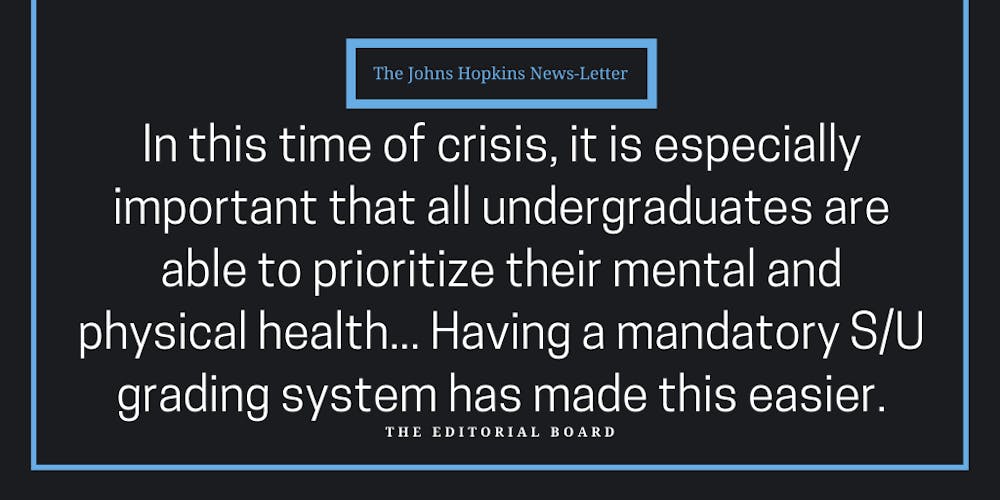When Hopkins implemented mandatory, universal satisfactory/unsatisfactory (S/U) grading for all undergraduates at Homewood on March 27, we supported the decision. It took into account the thousands of students who had signed petitions demanding alternative grading systems during the ongoing coronavirus pandemic, as well as direct input from the Student Government Association (SGA) and the Homewood Academic Council.
While the Krieger School of Arts and Sciences (KSAS) and the Whiting School of Engineering (WSE) have adopted the mandatory S/U grading policy, one Hopkins division for undergraduates has not: the Peabody Institute.
On March 27, Peabody settled for an opt-out S/U system for this spring. On April 2, KSAS administrators clarified that dual-degree students will be subject to Homewood’s grading policy for all of their classes. Although Peabody administrators stated that the policy was appropriate for their students, why their decision differs from that of KSAS or WSE remains unclear.
Since the suspension of in-person classes, Homewood students have become all too familiar with the complications of online learning. The structure of lectures and seminars has remained largely the same, but lab courses have changed significantly. In all cases, students’ capacity to learn and engage is limited.
For students at Peabody, the obstacles of learning online are even more pronounced. Nearly every Peabody course, with a focus on developing vocal, instrumental or dance skills, requires in-person interaction by nature. While only some Homewood classes are drastically different online, most Peabody courses are now unrecognizable.
Peabody has loaned out over 150 instruments. But not all students have the necessary resources; some are using keyboards printed on paper. Not all students have the privacy, space or environment they need in their homes to practice; some are dancing on unsuitable floors at the expense of their health.
Perhaps one of the greatest disappointments for these students is that they no longer have the final concerts or recitals that are central to their education. They must sing, play or dance alone, without an audience, a stage or accompaniment. They do not have the most important platform they need to demonstrate what they have learned this year.
Peabody students are largely upset at opt-out S/U grading, and for good reason. Evaluating performances through Zoom is extremely difficult when not all students have access to decent sound quality or stable internet. It simply does not make sense to ascribe grades to a drastically altered online learning experience. The grades students get this semester will not reflect their actual ability.
Universal S/U grading guarantees that students can prioritize their health this semester. Under an optional S/U grading system, graduate and professional program applicants could be rejected on the basis of keeping their grades covered. In a crisis like this, students should be prioritizing their physical and mental well-being, not their grades.
Homewood administrators understood the need to even the playing field for all. Peabody administrators did not. It is worth noting that this is not the first time that there have been notable discrepancies between Peabody and Homewood students in terms of the support that they receive. Though formally a part of the Hopkins population, Peabody undergraduates do not have the same immediate access to vital student services as KSAS and WSE students do. They must travel to Homewood for resources such as HelWell, the Counseling Center and the Office of Institutional Equity.
Peabody students’ ability to organize is also severely limited. The student body is smaller than Homewood’s, and the Peabody General Assembly is less developed than SGA. When Peabody undergraduates feel that their needs are not being met, how do they mobilize? How do they ensure that their voices are heard?
In this time of crisis, it is especially important that all undergraduates are able to prioritize their mental and physical health. For Homewood students, having a mandatory S/U grading system has made this easier to do. Peabody students deserve the same.





